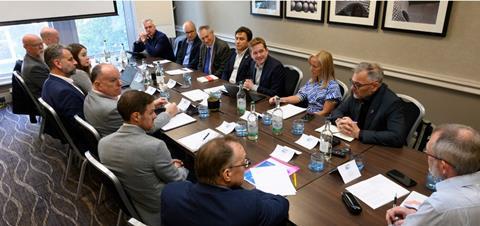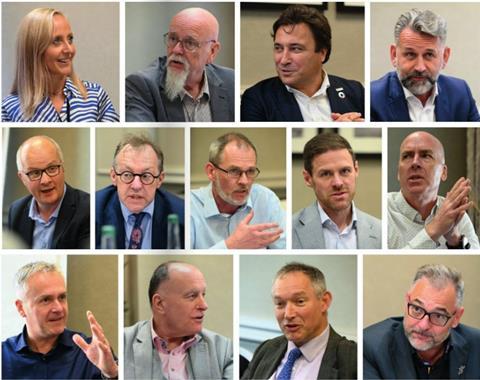Our penultimate Building the Future Commission regional roundtable focused on the West Midlands. Local experts from the built environment met in Birmingham, with the support of the Confederation of Timber Industries, to discuss the industry’s future and brainstorm ideas. Jordan Marshall reports

Levelling up has been a hot topic on the political agenda for an extended period of time and the West Midlands is one region where there is huge potential for it.
So Birmingham seemed to be the perfect place to explore how the construction industry could benefit from the agenda if investment is made in the right areas.
In the words of David Hopkins, chief executive of Timber Development UK: “‘Levelling up’ – if taken seriously and done properly – offers excellent opportunities but the biggest barrier [is] government not really getting behind it, beyond vacuously repeating the slogan.”
Since the start of the year, the Building the Future Commission has been working to discover solutions and initiatives to improve the built environment.
As part of the commission’s fact-finding work, and in partnership with Constructing Excellence, we are going around the country convening high-level roundtable discussions with experts in different regions to ensure that the commission hears from all corners of the UK.

The first of these saw Building gather a group of experts who each had links to the East of England for a chat about skills in a region that some see as living in London’s shadow. Next we headed to Newcastle to hear from those in the North-east, focusing on net zero and energy.
The third stop was Manchester for a discussion about the work opportunities for built environment firms in the North-west and how they can best deliver the region’s needs.
The most recent leg of the tour saw us head to Birmingham for a session, sponsored by the Confederation of Timber Industries, on levelling up in the West Midlands and exactly what that means for the construction industry in the region.
The West Midlands panel (listed below), chaired by Building’s head of content Carl Brown, was made up of construction experts from across the supply chain, all of whom have strong connections to the region and a high level of local knowledge and experience.
Attendees
- Chair: Carl Brown, head of content, Assemble Media Group
- Cem Budak, director and Midlands leader, Arup
- Tim Bush, equity partner, Baily Garner
- Andrew Carpenter, director, Confederation of Timber Industries
- Paul Chatwin, sustainability associate director, Cundall
- Stephen Crichton, director of project management, Gleeds
- Charlotte El Hakiem, planning director, Marrons
- David Hopkins, chief executive, Timber Development UK
- Robert Lambe, chief executive, Melius Homes
- Rob Lamond, head of strategy and analysis for housing, property and regeneration, West Midlands Combined Authority
- Stuart Penn, Midlands region managing director, Lovell Partnership
- Simon Tolson, senior partner, Fenwick Elliott
- Mark Wakeford, chairman, EvoEnergy
- Richard Whittaker, director of development, Citizen
Commitment is required
Hopkins said the clear barrier to levelling up achieving its potential is that the government is still pursuing too many policies that run counter to its aims, namely the policy of austerity and budget cuts that have been central to its approach since 2010. “As an example, investment in local manufacturing when it comes to offsite timber construction has huge opportunities for skilled jobs within it, particularly if you have strong environmental targets within that agenda,” he said. “But I don’t believe the government is massively committed to this agenda.”
Cem Budak, director and Midlands leader at Arup, agreed on this point, saying that the main difference between the productivity of cities is their infrastructure in the broadest sense and so levelling up gives regions such as the West Midlands and cities like Birmingham the opportunity to “catch up” with places like London. But, he added, inconsistent investment from government is most definitely a barrier to this. “We need momentum and commitment; it can’t be start-stop. It doesn’t need to be everything, but at least a handful of things that allow for sustained planned work.”

On this point, Stephen Crichton, director of project management at Gleeds, said: “There is an obvious lack of commitment as we don’t know what the next stage of levelling up funding is. Is there a next stage? That would be nice to know.”
The need for sustained commitment is something Lovell Partnerships’ regional managing director, Stuart Penn, said is integral to estate regeneration – something he considers to pose a great opportunity for the region if done right. He said: “Doing proper estate regeneration requires more than what is possible with the current situation. If done properly it helps with skills, as you can get local kids engaged. It inherently helps with issues such as energy poverty, which supports the agenda. But at the moment the central government commitment is not there.”
Local skills
Many around the table agreed that creating local skills and jobs is one of the key potential benefits of levelling up, although several also identified significant current blockers. “There are three universities across the Midlands with construction careers courses,” said Tim Bush, equity partner at Baily Garner. “But all three universities have let us down.” He went on to explain that the firm had recently brought in a number of young staff through a part-time degree course pathway, only for the university to cancel their places. A lack of uptake was said to be the reason. “Something clearly needs to be done, but what responsibility lies with the industry, what lies with government, and what lies with the institutions? We are trying to do the right thing in developing local skills, but it’s a concern.”
Rob Lamond, head of strategy and analysis for housing, property and regeneration at the West Midlands Combined Authority (WMCA), said the organisation has been trying to assist in these areas. “We’ve tried as WMCA to try and broker certain things such as the development of modular and offsite, but also the education, skills and university piece. It may be an area where we need more focus.”

Mark Wakeford, chairman of EvoEnergy, said there are opportunities there still and that part of the responsibility certainly falls to industry to engage with the institutions. “We are going to create an opportunity for an apprenticeship in the solar energy space, but it’s being driven by industry. We are successful despite government rather than because of it.” He also noted that the further education sector presents a ripe opportunity for the construction sector (see recommendations panel, below).
Fenwick Elliott partner Simon Tolson agreed that investment is required to align education with the construction sector. “There needs to be encouragement and pathways at a young level – and the industry could do more to encourage that in the right, positive way.”
For his part, Richard Whittaker, director of development at Citizen, said it is vital that the focus is on not just recruiting but retraining. “There are people who have been on site for decades who have the knowledge and skills to move into roles we need, we need to be doing more to enable that,” he said.
What’s going on with the Building the Future Commission?

Upcoming Building the Future Commission events
25 October: Wales roundtable (by invitation)
Late November (date TBC): Young Persons’ Advisory Panel roundtable (by invitation only)
Previous reports from the Building the Future Commission roundtables
>>Tackling the east of England’s construction skills challenge
>>Addressing net zero in the North-east
>>How do we boost construction in the North-west?
Research from the Building the Future Commission
>>Building the Future Commission: Report into the English planning system
>>Growth through innovation: A guide to technological trends shaping construction’s future
From the Commissioners and Young Persons’ Advisory Panel
>> Tackling short termism: we hear from the Building the Future Commissioners
>> How can we tackle the skills crisis? The next generation reports
Net zero and levelling up
Robert Lambe, chief executive of Melius Homes, raised the point that the net zero agenda and specifically, panellised offsite manufacturing could be sources of huge benefit to the levelling up agenda. He said: “The localism of offsite manufacturing can really help with the levelling up cause as well as having the potential to help tackle the net zero agenda.”
On this point, Andrew Carpenter, director of Confederation of Timber Industries, agreed. “Panellised systems appear to be the way; volumetric systems don’t seem to be commercially stacked up at the moment,” he said. “If you invest in levelling up in the panellised systems sector at the moment there are mainly local SMEs – it helps with local jobs and the net zero agenda all in one.” (See recommendations panel, below.)
Cundall sustainability associate director Paul Chatwin added that retrofit and the skills to deliver it are an area that needs to be considered when thinking about levelling up. “As an example, airtightness can be harder to achieve in existing stock, but improving things like that are core to developing the skills and buildings needed. There is going to be a big push to make current resources work harder.” He said increased efficiency is core to economic levelling up, particularly in the current economic environment as well as net zero goals.
Planning is key
There was much conversation around the table regarding the need for the planning system to be unlocked to speed up development (see recommendations panel, below). Charlotte El Hakiem, planning director at Marrons, said for that to happen, investment is need. “Resources are needed in planning now in order to entice people into the profession. There are no real resources available. Resources have become fewer, while the system has become more complex. It’s a crippling effect.”
She and Citizen’s Whittaker both saw it as integral that the pre-application process should be streamlined to allow opportunities to be realised more rapidly.
The solutions
As the roundtable approached its conclusion after 90 minutes of robust debate, the panel were asked to produce proposals for the Building the Future Commission. Responses (see below) included suggestions around issues and solutions that could feed into maximising the potential of the levelling up agenda.
Ideas from the panel
- Streamline the planning system
A significant portion of the panel thought streamlining and resourcing the planning system is key to realising the levelling up agenda – as it will allow the regions to develop at pace. On this point, Marrons’ El Hakiem said the use of the pre-application process needs to be reduced: “For submitting larger schemes it makes sense. It allows that engagement; it allows details or issues to be thrashed out. But if it’s just a little bit contentious? I don’t think that is a good use of resource.” She said that as the planning authority will not actually come back with a decision based on the pre-application, for smaller projects it is better for project timelines and broader development pipelines that these developers are allowed to submit an application from the outset. - Regeneration must be at the heart of levelling up
WMCA’s Lamond and Lovell’s Penn are both staunch believers that if the government is serious about levelling up the country then there must be a focus on regeneration in the regions. “There used to be a time where you could see the difference you were making with regeneration,” said Penn. “But now there’s no new funding available. How does it move the dial on large‑scale, long-term regeneration? It’s smoke and mirrors.” Lamond concurred that estate regeneration is a major challenge but said he hopes the fact regeneration will be devolved to the combined authority in 2026 will allow for the investment in regeneration needed to progress. - Net zero and offsite is core to the levelling up agenda
The Confederation of Timber Industries’ Carpenter said the main opportunity for construction on the levelling up front is “build back better” when it comes to net zero. An example of this, he said, is the increasing willingness of clients when it comes to pushing for timber construction. Carpenters believes this allows for increased local offsite manufacture, boosting local economies and progressing the net zero agenda. - The further education sector is key to developing local skills
“Further education is the Cinderella of education,” said EvoEnergy’s Wakeford. “It is the sector that just hasn’t been maximised and there is definitely more the built environment sector can do to work with them – they want to meet people and understand needs.” He added that there are big benefits for potential recruits as well as it means they don’t come out with debt and there is potential for big employment tie-ins.
The Building the Future Commission

The Building the Future Commission is a year-long project, launched to mark Building’s 180th anniversary, to assess potential solutions and radical new ways of thinking to improve the built environment, with thanks to our national headline sponsors Fenwick Elliott and Gleeds.
The major project’s work will be guided by a panel of 19 major figures who have signed up to help guide the commission’s work culminatuing culminate in a report published at the end of the year.
The commissioners include figures from the world of contracting, housing development, architecture, policy-making, skills, design, placemaking, infrastructure, consultancy and legal.
They include Katy Dowding, executive vice president at Skanska, Richard Steer, chair of Gleeds, Lara Oyedele, president of the Chartered Institute of Housing, Mark Wild, former boss of Crossrail and chief executive of SGN, and Simon Tolson, senior partner at Fenwick Elliott. See the full list here.
The project is looking at proposals for change in eight areas:
- Education and skills
- Housing and planning
- Energy and net zero
- Infrastructure
- Building safety
- Project delivery and digital
- Workplace culture and leadership
- Creating communities
>> Editor’s view: And now for something completely positive – our Building the Future Commission
>> Click here for more about the project and the commissioners
Building the Future is also undertaking a countrywide tour of roundtable discussions with experts around the regions as part of a consultation programme in partnership with the regional arms of industry body Constructing Excellence. There is also a young person’s advisory panel.




























No comments yet